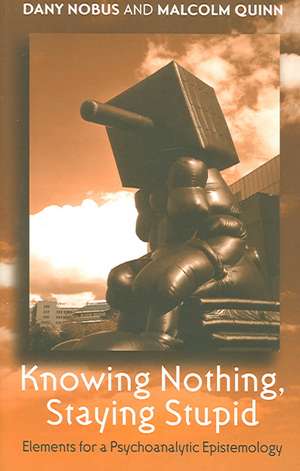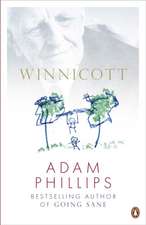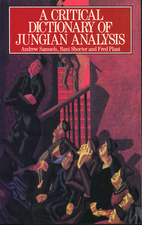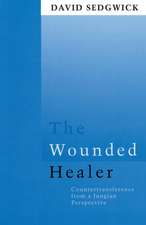Knowing Nothing, Staying Stupid: Elements for a Psychoanalytic Epistemology
Autor Dany Nobus, Malcolm Quinnen Limba Engleză Paperback – 23 iun 2005
What is the value of a 'dialectics of ignorance' for analysts and academics?
Knowing Nothing, Staying Stupid draws on recent research to provide a thorough and illuminating evaluation of the status of knowledge and truth in psychoanalysis. Adopting a Lacanian framework, Dany Nobus and Malcolm Quinn question the basic assumption that knowledge is universally good and describe how psychoanalysis is in a position to place forms of knowledge in a dialectical relationship with non-knowledge, blindness, ignorance and stupidity. The book draws out the implications of a psychoanalytic theory of knowledge for the practices of knowledge construction, acquisition and transmission across the humanities and social sciences.
The book is divided into two sections. The first section addresses the foundations of a psychoanalytic approach to knowledge as it emerges from clinical practice, whilst the second section considers the problems and issues of applied psychoanalysis, and the ambiguous position of the analyst in the public sphere. Subjects covered include:
The Logic of Psychoanalytic Discovery
Creative Knowledge Production and Institutionalised Doctrine
The Desire to Know versus the Fall of Knowledge
Epistemological Regression and the Problem of Applied Psychoanalysis
This provocative discussion of the dialectics of knowing and not knowing will be welcomed by practicing psychoanalysts and students of psychoanalytic studies, but also by everyone working in the fields of social science, philosophy and cultural studies.
Preț: 333.55 lei
Preț vechi: 351.11 lei
-5% Nou
Puncte Express: 500
Preț estimativ în valută:
63.83€ • 68.25$ • 53.22£
63.83€ • 68.25$ • 53.22£
Carte tipărită la comandă
Livrare economică 17 aprilie-01 mai
Preluare comenzi: 021 569.72.76
Specificații
ISBN-13: 9781583918685
ISBN-10: 158391868X
Pagini: 264
Dimensiuni: 138 x 216 x 21 mm
Greutate: 0.49 kg
Ediția:Revised
Editura: Taylor & Francis
Colecția Routledge
Locul publicării:Oxford, United Kingdom
ISBN-10: 158391868X
Pagini: 264
Dimensiuni: 138 x 216 x 21 mm
Greutate: 0.49 kg
Ediția:Revised
Editura: Taylor & Francis
Colecția Routledge
Locul publicării:Oxford, United Kingdom
Public țintă
Professional Practice & DevelopmentCuprins
Introduction. Part I: The Subject of Psychoanalysis: Knowledge, Truth and Meaning. Midwifes of the Whys and Wherefores: On the Logic of Psychoanalytic Discovery. A Matter of Cause: Knowledge and Truth in the Practice of Psychoanalysis. The Punning of Reason: Meaning, Nonsense and the Limits of Psychoanalytic Language. Knowledge in Failure: Crisis of Legitimacy and the Emergence of Institutionalised Doctrine. Part II: Less than Knowledge: Psychoanalysis and the Economies of Thought. Reading Seminar XVII: From the Desire to Know to the Fall of Knowledge. Concluding the Time for Comprehending: The Epistemological Reversal of the Knowledge at Risk. The Game Beneath the Game: Logical Aspects of the Artifice, the Dummy and the Hoax. Epistemological Regression and the Problem of Applied Psychoanalysis. Coda Conceptualising the Rigorous Hole.
Notă biografică
Dany Nobus is Professor of Psychology and Psychoanalysis, Brunel University. He is the author of Jacques Lacan and the Freudian Practice of Psychoanalysis and the Editor-in-Chief of Journal for Lacanian Studies.
Malcolm Quinn is Reader in Critical Practice, University of the Arts London. He has published work on the fascist spectacle, art and cultural politics. He is an Editor of Journal for Lacanian Studies.
Malcolm Quinn is Reader in Critical Practice, University of the Arts London. He has published work on the fascist spectacle, art and cultural politics. He is an Editor of Journal for Lacanian Studies.
Recenzii
'This is the most useful guide to so-called applied psychoanalysis that I have ever read.' - Jason B. Jones, Psychoanalysis, Class and Society
Descriere
This provocative discussion of the dialectics of knowing and not knowing, and how they inform Freudian and Lacanian theory, will be welcomed by practicing psychoanalysts and students of the humanities and social sciences.
















